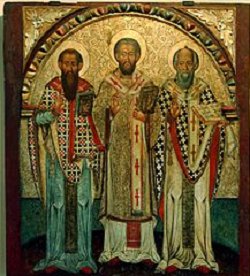
The Trinity and the Cappadocian Fathers
The Korean-German philosopher Byung Chul Han of “The society of fatigue”, started from the analysis of Vita Activa by Hanna Arendt (we translate Vita from Latin, for life until now), explaining that it starts from the prevalence in the Christian life of the contemplative life, clarifies in a note that she seeks “a mediation between vita active and contemplative life”, and even though she is not a Christian she uses the passage described by São Gregório: “we have to know: when we demand a good life program, that we move from vita active to vita contemplativa, then, it is often useful if the soul returns from the contemplative life to the active one, in such a way that it is called the contemplation that has been lit in the heart and transmits all its perfection to the activity. ” (HAN, 2015, p. 39)
of “The society of fatigue”, started from the analysis of Vita Activa by Hanna Arendt (we translate Vita from Latin, for life until now), explaining that it starts from the prevalence in the Christian life of the contemplative life, clarifies in a note that she seeks “a mediation between vita active and contemplative life”, and even though she is not a Christian she uses the passage described by São Gregório: “we have to know: when we demand a good life program, that we move from vita active to vita contemplativa, then, it is often useful if the soul returns from the contemplative life to the active one, in such a way that it is called the contemplation that has been lit in the heart and transmits all its perfection to the activity. ” (HAN, 2015, p. 39)
The rush runs from day to day does not allow this balance, but in times of pandemic we were called to rethink our social life, our relationship with the people of our home and also consumption and solidarity with those who in these times lost jobs, spend limitations and are vulnerable.
However St. Gregory has another bias in his thinking about the trinity, with his friends also cappadocians, these priests were forced to make a self-defense of the charge of Tritheism (3 gods) that weighed on them and then three great theologians of Cappadocia (Asia Minor): St. Basil the Great (330-379), his blood brother Gregory of Nissa (+349), resolved the issue.
Seen by Greek philosophy, which dominated Western culture, “Mia Ousia treis hypostasis”, means that ousia guarantees unity while substantia et tres persone ensures that each of the three people is unique, and perhaps the most difficult to understand that there are in fact three distinct people.
Saint Basil was the first to establish the distinction by saying that in God there are three people or three hypostases, as we have already written, means the prosopon, which is what for the Greeks the person.
As we wrote last week there was a neglect of the Trinitarian relationship, in philosophical terms it is the dualism of thought, the inability to understand situations that are always from different worldviews, but that must maintain unity.
In religious terms, it means the loss of relational capacity, solidarity and fraternity with the other, seeking a religion that is sometimes Manichaean, sometimes fundamentalist, without any appeal to unity (ousia) and respect for the dignity of the person (hypostases), in short, the relationship Trinitarian.









